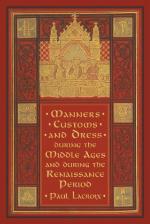“The importance of children, and particularly of the eldest son, was greater in feudal houses than elsewhere.... The eldest son of the noble was, in the eyes of his father and of all his followers, a prince and heir-presumptive, and the hope and glory of the dynasty. These feelings, and the domestic pride and affection of the various members one to another, united to give families much energy and power..... Add to this the influence of Christian ideas, and it will be understood how this lonely, dull, and hard castle life was, nevertheless, favourable to the development of domestic society, and to that improvement in the condition of women which plays such a great part in the history of our civilisation.”
[Illustration: Fig. 48.—Court of Love in Provence in the Fourteenth Century (Manuscript of the National Library of Paris).]
Whatever opinion may be formed of chivalry, it is impossible to deny the influence which this institution exercised on private life in the Middle Ages. It considerably modified custom, by bringing the stronger sex to respect and defend the weaker. These warriors, who were both simple and externally rough and coarse, required association and intercourse with women to soften them (Fig. 47). In taking women and helpless widows under their protection, they were necessarily more and more thrown in contact with them. A deep feeling of veneration for woman, inspired by Christianity, and, above all, by the worship of the Virgin Mary, ran throughout the songs of the troubadours, and produced a sort of sentimental reverence for the gentle sex, which culminated in the authority which women had in the courts of love (Fig. 48).
We have now reached the reign of Philip Augustus, that is to say, the end of the twelfth century. This epoch is remarkable, not only for its political history, but also for its effect on civilisation. Christianity had then considerably influenced the world; arts, sciences, and letters, animated by its influence, again began to appear, and to add charms to the leisure of private life. The castles were naturally the first to be affected by this poetical and intellectual regeneration, although it has been too much the custom to exaggerate the ignorance of those who inhabited them. We are too apt to consider the warriors of the Middle Ages as totally devoid of knowledge, and as hardly able to sign their names, as far as the kings and princes are concerned. This is quite an error; for many of the knights composed poems which exhibit evidence of their high literary culture.
It was, in fact, the epoch of troubadours, who might be called professional poets and actors, who went from country to country, and from castle to castle, relating stories of good King Artus of Brittany and of the Knights of the Round Table; repeating historical poems of the great Emperor Charlemagne and his followers. These minstrels were always accompanied by jugglers and instrumentalists, who formed a travelling troop




